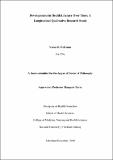Developments in health literacy over time: A longitudinal qualitative research study

View/
Date
2019-12-12Author
McKenna, Verna
Metadata
Show full item recordUsage
This item's downloads: 402 (view details)
Abstract
Introduction
Conceptualising health literacy as a relational concept, which involves how individuals interact with complex health and social systems, requires a greater understanding of the context of people’s health experiences.
Aims
The overall aim of this study is to examine how health literacy develops over time in the management of health and illness among a group of individuals attending a structured cardiovascular risk reduction programme. The study also examines the facilitators and barriers in that process.
Methods
A longitudinal qualitative study design was undertaken to address the study aims. A semi-structured interview guide, informed by Sørensen’s conceptual model of health literacy, was used to explore the development of health literacy and to identify changes in knowledge, attitudes and experiences over time at three separate time points. The HLS-EU-Q47 was used to provide a guide on the health literacy level of participants at Phases 1 and 3 of the study. Twenty-six participants were purposefully selected from a cardiovascular risk reduction programme. Thematic analysis and longitudinal question interpretive and analytic frameworks were used in data analysis.
Results
Results from the study showed developments in health literacy across the functional, interactive and critical levels of health literacy. The health care provider provided a crucial role for individuals in the development of all aspects of health literacy. While, in the main, individuals reported perceptions of increased feelings of empowerment and control related to managing health and illness, these developments could be adversely impacted by both psychological and structural barriers.
Conclusions
Positive developments in health literacy capacities are important for the self-management of health and illness. Longitudinal findings underscore the importance of healthcare providers in supporting the development of health literacy. These findings lend support to the need to integrate health literacy into health care interventions and to incorporate health literacy into medical training and other curricula for health professionals.
Collections
Except where otherwise noted, this item's license is described as Attribution-NonCommercial-NoDerivs 3.0 Ireland
Related items
Showing items related by title, author, creator and subject.
-
Toward international collaboration on credentialing in health promotion and health education: The Galway Consensus Conference
Barry, Margaret M. (SAGE Journals Online, 2009-05)The interest in competencies, standards, and quality assurance in the professional preparation of public health professionals whose work involves health promotion and health education dates back several decades. In ... -
Researching health inequalities in adolescents: The development of the Health Behaviour in School-Aged Children (HBSC) Family Affluence Scale.
Molcho, Michal (Elsevier, 2008)Socioeconomic inequalities in adolescent health have been little studied until recently, partly due to the lack of appropriate and agreed upon measures for this age group. The difficulties of measuring adolescent socioeconomic ... -
Toward international collaboration on credentialing in health promotion and health education: the galway consensus conference
Allegrante, John P.; Barry, Margaret M.; Auld, M. Elaine; Lamarre, Marie-Claude; Taub, Alyson (SAGE Publications, 2009-05-15)The interest in competencies, standards, and quality assurance in the professional preparation of public health professionals whose work involves health promotion and health education dates back several decades. In Australia, ...

